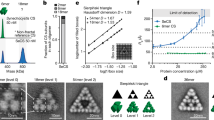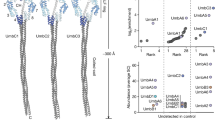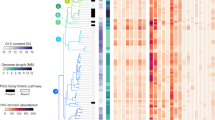Abstract
Cellulose is the most abundant renewable carbon resource on earth and is an indispensable raw material for the wood, paper, and textile industries. A model system to study the mechanism of cellulose biogenesis is the bacterium Acetobacter xylinum which produces pure cellulose as an extracellular product. It was from this organism that in vitro preparations which possessed high levels of cellulose synthase activity were first obtained in both membranous and soluble forms1–3. We recently demonstrated that this activity is subject to a complex multi-component regulatory system4,5, in which the synthase is directly affected by an unusual cyclic nucleotide activator enzymatically formed from GTP, and indirectly by a Ca2+-sensitive phosphodiesterase which degrades the activator. The cellulose synthase activator (CSA) has now been identified as bis-(3′ → 5′)-cyclic diguanylic acid (5′G3′p5′G3′p) on the basis of mass spectroscopic data, nuclear magnetic resonance analysis and comparison with chemically synthesized material. We also report here on intermediary steps in the synthesis and degradation of this novel circular dinucleotide, which have been integrated into a model for the regulation of cellulose synthesis.
This is a preview of subscription content, access via your institution
Access options
Subscribe to this journal
Receive 51 print issues and online access
$199.00 per year
only $3.90 per issue
Buy this article
- Purchase on Springer Link
- Instant access to full article PDF
Prices may be subject to local taxes which are calculated during checkout
Similar content being viewed by others
References
Aloni, Y., Delmer, D. P. & Benziman, M. Proc. natn. Acad. Sci. U.S.A. 79, 6448–6452 (1982).
Benziman, M., Aloni, Y. & Delmer, D. P. J. appl. Polymer Sci. 37, 131–143 (1983).
Aloni, Y., Cohen, R., Benziman, M. & Delmer, D. P. J. biol. Chem. 258, 4419–4423 (1983).
Ross, P. et al. FEBS Lett. 186, 191–196 (1985).
Ross, P. et al. Carbohydr. Res. 149, 101–117 (1986).
Tener, G. M. Meth. Enzym. 12A, 394–404 (1967).
Egami, F., Takahashi, K. & Uchida, T. Prog. nucl. Acid Res. molec. Biol. 3, 59–62 (1964).
Lin, F. C., Brown, R. M., Cooper, J. B. & Delmer, D. P. Science 230, 822–825 (1985).
Martin, E. M., Birdsall, N. J. M., Brown, R. E. & Kerr, I. M. Eur. J. Biochem. 95, 295–307 (1979).
Hinrichsen, A. I., Ortner, I. M. & Hartmann, R. FEBS Lett. 193, 199–202 (1985).
Hsu, C. J. & Dennis, D. Nucleic Acids Res. 10, 5637–5647 (1982).
Hsu, C. J., Dennis, D. & James, R. A. Nucleosides & Nucleotides 4, 377–389 (1985).
Wreesmann, C. T. J., Fidder, A., Veeneman, G. H., van der Marel, G. A. & van Boom, J. H. Tetrahedron Lett. 26, 933–936 (1985).
Hurwitz, J. & Novogrodsky, A. Meth. Enzymol. 12B, 207–212 (1968).
Author information
Authors and Affiliations
Rights and permissions
About this article
Cite this article
Ross, P., Weinhouse, H., Aloni, Y. et al. Regulation of cellulose synthesis in Acetobacter xylinum by cyclic diguanylic acid. Nature 325, 279–281 (1987). https://doi.org/10.1038/325279a0
Received:
Accepted:
Issue Date:
DOI: https://doi.org/10.1038/325279a0
This article is cited by
-
Regulation of the physiology and virulence of Ralstonia solanacearum by the second messenger 2′,3′-cyclic guanosine monophosphate
Nature Communications (2023)
-
Analysis of cellulose synthesis in a high-producing acetic acid bacterium Komagataeibacter hansenii
Applied Microbiology and Biotechnology (2023)
-
Metabolomic profiling of bacterial biofilm: trends, challenges, and an emerging antibiofilm target
World Journal of Microbiology and Biotechnology (2023)
-
Patterns of abundance, chromosomal localization, and domain organization among c-di-GMP-metabolizing genes revealed by comparative genomics of five alphaproteobacterial orders
BMC Genomics (2022)
-
Killing the messenger to evade bacterial defences
Nature (2022)
Comments
By submitting a comment you agree to abide by our Terms and Community Guidelines. If you find something abusive or that does not comply with our terms or guidelines please flag it as inappropriate.



